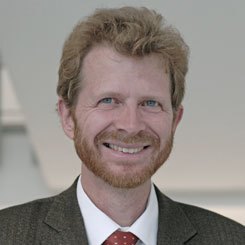Euthanasia
“Germany has found a moderate solution”

Palliative doctor Lukas Radbruch explains how euthanasia is debated in Germany today and what it means to develop a “dying culture”.
“Euthanasia” is a confusing term. It covers the unproblematic “passive euthanasia”, whereby certain treatments are limited or withdrawn at the end of the patient's life. However, it also refers to “assisted suicide”, which is illegal in Germany, as well as “physician-assisted suicide”. Added to that, a new law came into effect at the end of 2015 but does it put an end to the somewhat controversial debate?
 Lukas Radbruch
| Photo: © private
In fact, since then there has hardly been a public discussion on the issue in almost a year. The change to the criminal code, which now explicitly forbids any kind of commercial assisted suicide, appeared to have allayed any concerns. Unbelievably, however, the debate has just been reopened. A number of petitions to the constitutional court have been filed for which expert opinions have been gathered. The situation is plagued by uncertainty as doctors continue to worry about the possibility of substantial changes in the treatment of terminally ill patients. In truth it is the term “commercial” which has ignited the debate.
Lukas Radbruch
| Photo: © private
In fact, since then there has hardly been a public discussion on the issue in almost a year. The change to the criminal code, which now explicitly forbids any kind of commercial assisted suicide, appeared to have allayed any concerns. Unbelievably, however, the debate has just been reopened. A number of petitions to the constitutional court have been filed for which expert opinions have been gathered. The situation is plagued by uncertainty as doctors continue to worry about the possibility of substantial changes in the treatment of terminally ill patients. In truth it is the term “commercial” which has ignited the debate.
The new section 217 of the criminal code now states that “whoever intentionally promotes the suicide of another person by granting, providing or arranging the opportunity to commit such an act through commercial means, will be sentenced to up to three years imprisonment or pay a fine.” Exempt are therefore those who “themselves do not act commercially” or the patient's relatives and those close to them. Are the doctors standing by a dying patient's side now in more danger of being prosecuted?
I do not believe so. Ultimately, the patient’s general practitioner or palliative doctor can also be “close” to the patient in the eyes of the law. When I write a patient a monthly prescription for a considerably high dose of morphine, I am, in my capacity as a doctor, providing pain relief. Under no circumstances am I helping them commit suicide, even if this patient had once before mentioned that their situation were so terrible that they would prefer to end their life. It is certainly not uncommon for patients to talk to their doctors about such things. Furthermore, it is possible to discuss self-regulated methods with them such as foregoing food and liquids. The patient also has the right to refuse life-saving treatments.
“It is good that the threshold is as high as it is”
In that case was the new section of the criminal code necessary? Even the German Ethics Council concluded that fundamentally there were no issues with the previous legal position.We, the German Society of Palliative Medicine, said from the outset that we didn't need a new law and the existing regulations were adequate. Both the national and the state German medical associations said that active euthanasia was not an issue for doctors and illegal in any case. However, I now believe it is good to have section 217 in the criminal code. The discussions on the different drafts in the run up to passing the law did provide the doctors with more certainty. For palliative doctors we feel we can work comfortably under this law. And it is good that the threshold is as high as it is: countries such as Belgium have shown us that even assisted suicide can become, to a greater extent, part of the natural order of things by opening the door just once on this issue. If we were to be more liberal in the way we dealt with assisted suicide, we could be heading down the wrong road.
In the Netherlands and Belgium both physician-assisted suicide as well as assisted suicide under certain circumstances are deemed legal. Does Germany view every kind of euthanasia particularly critically given her history?
I do not honestly think that the euthanasia programme during the Nazi era is still being mentioned in the debate. Similar discussions are taking place in neighbouring countries. We have found a moderate solution in Germany. I consider the Benelux countries as the exception and ourselves the mainstream.
To what extent are patients' advance directives accepted in Germany?
Nowadays they are still rarely issued compared to the USA for example, although since the Betreuungsgesetz was passed in 2009, a law concerning patient care, the number of advance directives has certainly increased. In some hospitals patients are asked about them as a matter of routine upon admission. Of course it is difficult to stipulate concrete details when you do not have a life-threatening illness. In such cases an advance directive is nevertheless of value since it serves as a clear indication of the patient's wishes in the event that they are no longer able to express them.
“You can also be a burden on others”
In a recommendation from December 2014 the German Ethics Council expressed its concern that the debate might concentrate purely on the issue of self-determination and the role of certain euthanasia organizations. They added it was important to develop a “dying culture” and improve palliative care. As president of the society which deals with this topic, you are unlikely to dispute this point?No, because in the vast majority of cases we, the palliative doctors, truly have something to offer: pain is something we can get a grip on with nearly all our patients and breathing difficulties can be treated effectively. About one in 100 patients who are treated in specialist care units require palliative sedation in their last days - in other words drugs which might cause them to lose consciousness. Despite the very best palliative care, requests for an assisted suicide and society's debate on the issue will not stop. There will always be one or two people who say, “what you're offering me is not an option. I don't want to be dependent on anyone.” Our task is to keep doing our job no matter what they say. When you look closer, you often see that the relatives or those treating the patient cannot see it from their perspective or that the terminally-ill patient does not want to be a burden on them. We are certainly a caring society, where you can also be a burden on others.
is the President of the German Society of Palliative Medicine, Chair for Palliative Medicine at the Rheinische Friedrich-Wilhelms University in Bonn, Director of the Clinic for Palliative Medicine in the same university clinic and Director of the Centre for Palliative Medicine at the Malteser Hospital Seliger Gerhard Bonn/Rhein-Sieg.